Social Isolation and Parenting: Case Study Analysis, IT Carlow
VerifiedAdded on 2022/09/07
|8
|2461
|11
Report
AI Summary
This report analyzes a case study focusing on the impact of social isolation on parenting, specifically examining the experiences of Miranda, a woman struggling with the loss of her mother and her husband's absence due to work. The report applies the theory of family systems, developmental stress concepts, and the five stages of change to understand Miranda's mental state. It explores the Hardiker model to assess the needs of her child and differentiates between micro and macro level social work approaches to identify appropriate interventions. The report also discusses the family assessment framework, strengthening family's framework, and Buckley's assessment framework as tools to support families facing similar challenges. It emphasizes the importance of mental health services, family support services, and the need for Miranda to reconnect with her children and seek support to overcome her trauma. The report concludes by highlighting the significance of family dynamics and the role of each family member in maintaining a healthy family unit, and it suggests suitable support systems for Miranda's situation.
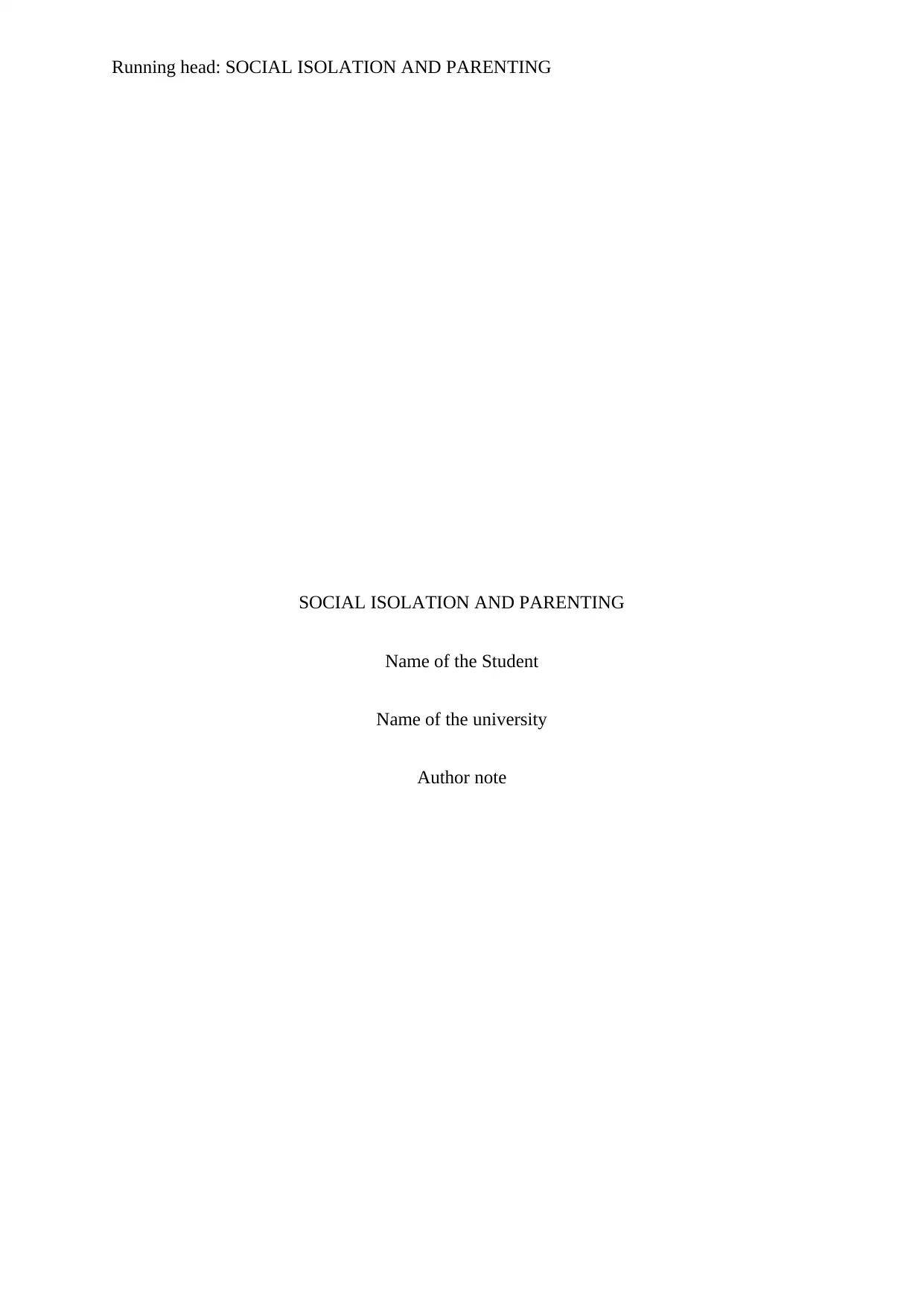
Running head: SOCIAL ISOLATION AND PARENTING
SOCIAL ISOLATION AND PARENTING
Name of the Student
Name of the university
Author note
SOCIAL ISOLATION AND PARENTING
Name of the Student
Name of the university
Author note
Paraphrase This Document
Need a fresh take? Get an instant paraphrase of this document with our AI Paraphraser
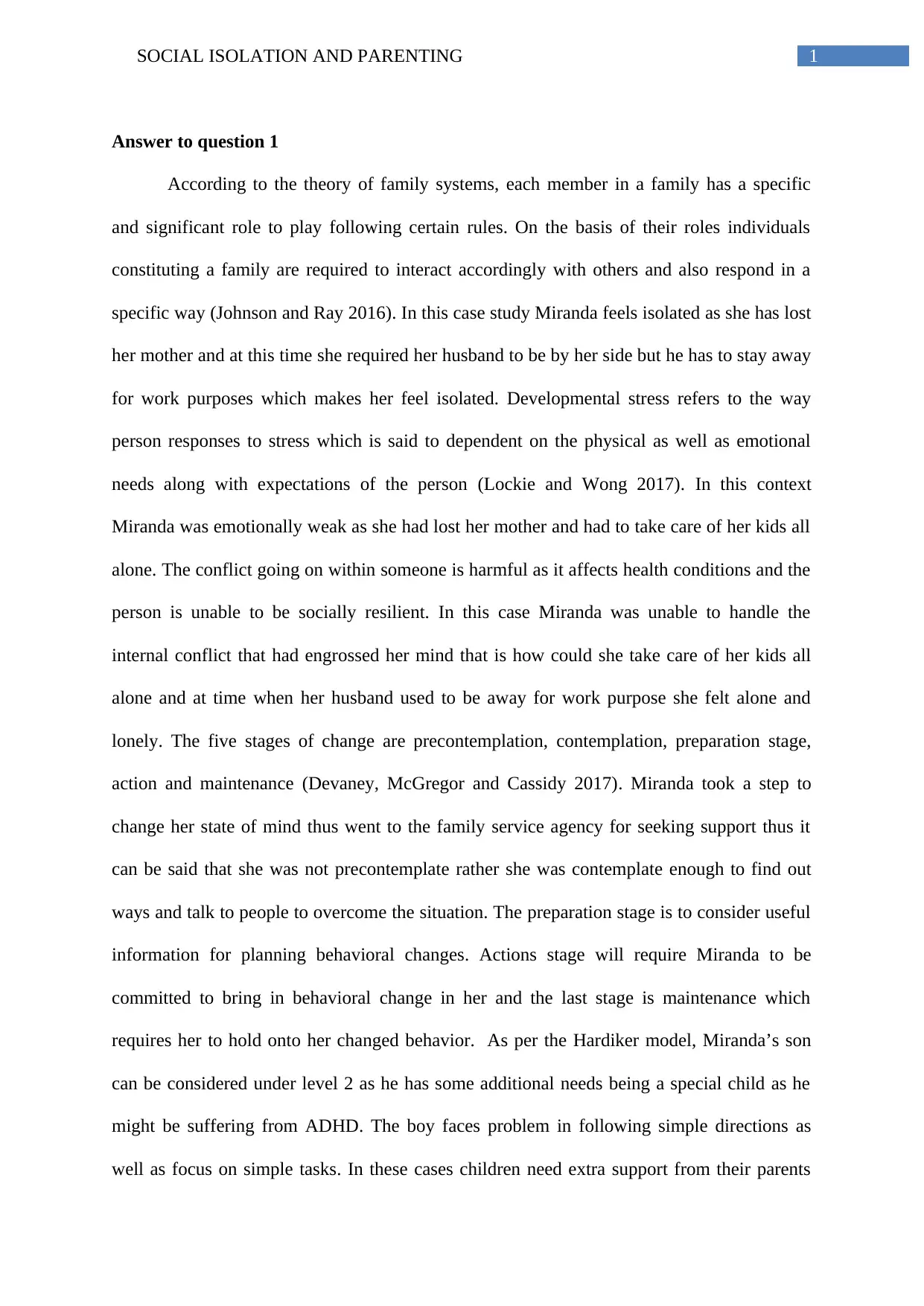
1SOCIAL ISOLATION AND PARENTING
Answer to question 1
According to the theory of family systems, each member in a family has a specific
and significant role to play following certain rules. On the basis of their roles individuals
constituting a family are required to interact accordingly with others and also respond in a
specific way (Johnson and Ray 2016). In this case study Miranda feels isolated as she has lost
her mother and at this time she required her husband to be by her side but he has to stay away
for work purposes which makes her feel isolated. Developmental stress refers to the way
person responses to stress which is said to dependent on the physical as well as emotional
needs along with expectations of the person (Lockie and Wong 2017). In this context
Miranda was emotionally weak as she had lost her mother and had to take care of her kids all
alone. The conflict going on within someone is harmful as it affects health conditions and the
person is unable to be socially resilient. In this case Miranda was unable to handle the
internal conflict that had engrossed her mind that is how could she take care of her kids all
alone and at time when her husband used to be away for work purpose she felt alone and
lonely. The five stages of change are precontemplation, contemplation, preparation stage,
action and maintenance (Devaney, McGregor and Cassidy 2017). Miranda took a step to
change her state of mind thus went to the family service agency for seeking support thus it
can be said that she was not precontemplate rather she was contemplate enough to find out
ways and talk to people to overcome the situation. The preparation stage is to consider useful
information for planning behavioral changes. Actions stage will require Miranda to be
committed to bring in behavioral change in her and the last stage is maintenance which
requires her to hold onto her changed behavior. As per the Hardiker model, Miranda’s son
can be considered under level 2 as he has some additional needs being a special child as he
might be suffering from ADHD. The boy faces problem in following simple directions as
well as focus on simple tasks. In these cases children need extra support from their parents
Answer to question 1
According to the theory of family systems, each member in a family has a specific
and significant role to play following certain rules. On the basis of their roles individuals
constituting a family are required to interact accordingly with others and also respond in a
specific way (Johnson and Ray 2016). In this case study Miranda feels isolated as she has lost
her mother and at this time she required her husband to be by her side but he has to stay away
for work purposes which makes her feel isolated. Developmental stress refers to the way
person responses to stress which is said to dependent on the physical as well as emotional
needs along with expectations of the person (Lockie and Wong 2017). In this context
Miranda was emotionally weak as she had lost her mother and had to take care of her kids all
alone. The conflict going on within someone is harmful as it affects health conditions and the
person is unable to be socially resilient. In this case Miranda was unable to handle the
internal conflict that had engrossed her mind that is how could she take care of her kids all
alone and at time when her husband used to be away for work purpose she felt alone and
lonely. The five stages of change are precontemplation, contemplation, preparation stage,
action and maintenance (Devaney, McGregor and Cassidy 2017). Miranda took a step to
change her state of mind thus went to the family service agency for seeking support thus it
can be said that she was not precontemplate rather she was contemplate enough to find out
ways and talk to people to overcome the situation. The preparation stage is to consider useful
information for planning behavioral changes. Actions stage will require Miranda to be
committed to bring in behavioral change in her and the last stage is maintenance which
requires her to hold onto her changed behavior. As per the Hardiker model, Miranda’s son
can be considered under level 2 as he has some additional needs being a special child as he
might be suffering from ADHD. The boy faces problem in following simple directions as
well as focus on simple tasks. In these cases children need extra support from their parents
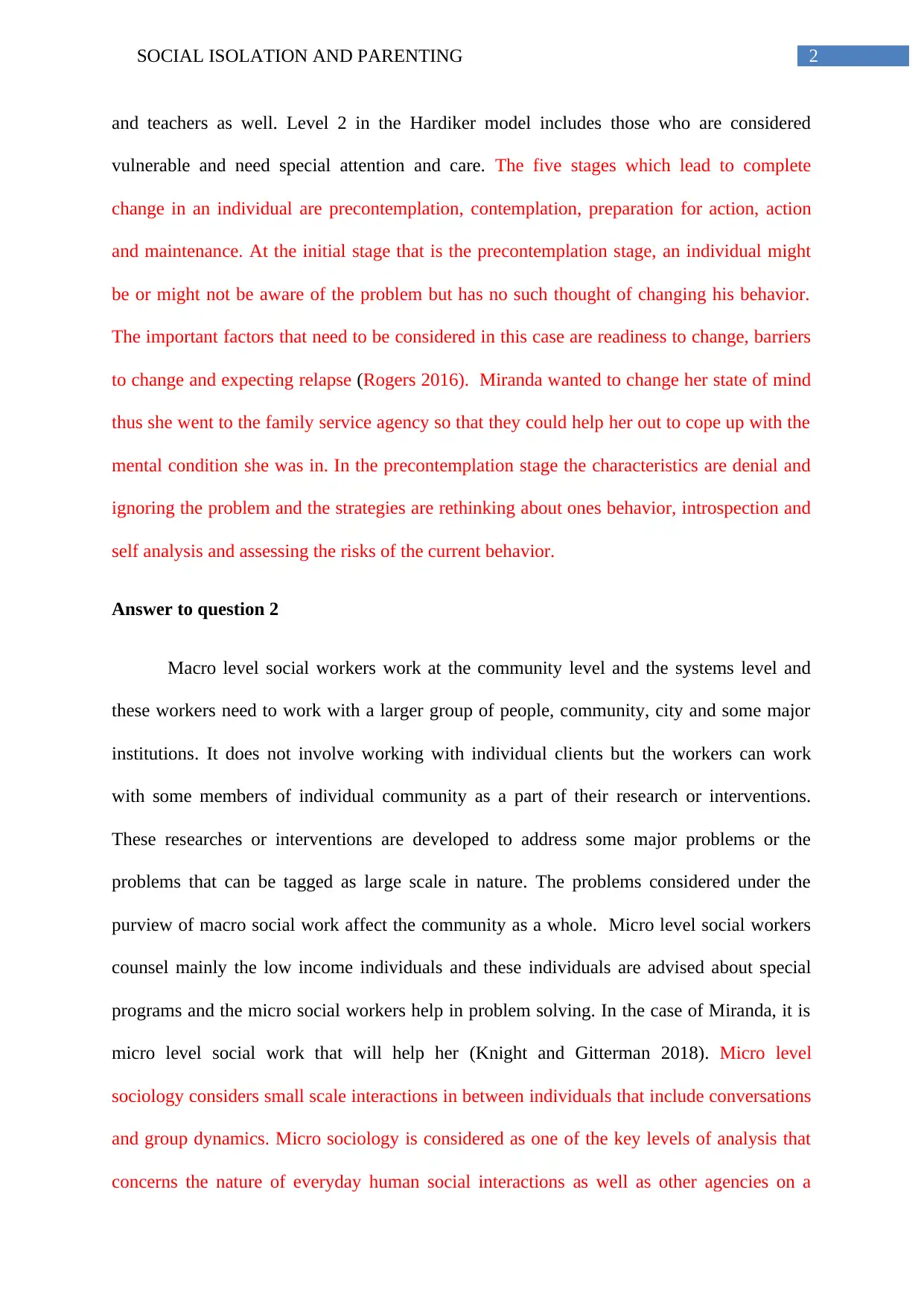
2SOCIAL ISOLATION AND PARENTING
and teachers as well. Level 2 in the Hardiker model includes those who are considered
vulnerable and need special attention and care. The five stages which lead to complete
change in an individual are precontemplation, contemplation, preparation for action, action
and maintenance. At the initial stage that is the precontemplation stage, an individual might
be or might not be aware of the problem but has no such thought of changing his behavior.
The important factors that need to be considered in this case are readiness to change, barriers
to change and expecting relapse (Rogers 2016). Miranda wanted to change her state of mind
thus she went to the family service agency so that they could help her out to cope up with the
mental condition she was in. In the precontemplation stage the characteristics are denial and
ignoring the problem and the strategies are rethinking about ones behavior, introspection and
self analysis and assessing the risks of the current behavior.
Answer to question 2
Macro level social workers work at the community level and the systems level and
these workers need to work with a larger group of people, community, city and some major
institutions. It does not involve working with individual clients but the workers can work
with some members of individual community as a part of their research or interventions.
These researches or interventions are developed to address some major problems or the
problems that can be tagged as large scale in nature. The problems considered under the
purview of macro social work affect the community as a whole. Micro level social workers
counsel mainly the low income individuals and these individuals are advised about special
programs and the micro social workers help in problem solving. In the case of Miranda, it is
micro level social work that will help her (Knight and Gitterman 2018). Micro level
sociology considers small scale interactions in between individuals that include conversations
and group dynamics. Micro sociology is considered as one of the key levels of analysis that
concerns the nature of everyday human social interactions as well as other agencies on a
and teachers as well. Level 2 in the Hardiker model includes those who are considered
vulnerable and need special attention and care. The five stages which lead to complete
change in an individual are precontemplation, contemplation, preparation for action, action
and maintenance. At the initial stage that is the precontemplation stage, an individual might
be or might not be aware of the problem but has no such thought of changing his behavior.
The important factors that need to be considered in this case are readiness to change, barriers
to change and expecting relapse (Rogers 2016). Miranda wanted to change her state of mind
thus she went to the family service agency so that they could help her out to cope up with the
mental condition she was in. In the precontemplation stage the characteristics are denial and
ignoring the problem and the strategies are rethinking about ones behavior, introspection and
self analysis and assessing the risks of the current behavior.
Answer to question 2
Macro level social workers work at the community level and the systems level and
these workers need to work with a larger group of people, community, city and some major
institutions. It does not involve working with individual clients but the workers can work
with some members of individual community as a part of their research or interventions.
These researches or interventions are developed to address some major problems or the
problems that can be tagged as large scale in nature. The problems considered under the
purview of macro social work affect the community as a whole. Micro level social workers
counsel mainly the low income individuals and these individuals are advised about special
programs and the micro social workers help in problem solving. In the case of Miranda, it is
micro level social work that will help her (Knight and Gitterman 2018). Micro level
sociology considers small scale interactions in between individuals that include conversations
and group dynamics. Micro sociology is considered as one of the key levels of analysis that
concerns the nature of everyday human social interactions as well as other agencies on a
⊘ This is a preview!⊘
Do you want full access?
Subscribe today to unlock all pages.

Trusted by 1+ million students worldwide
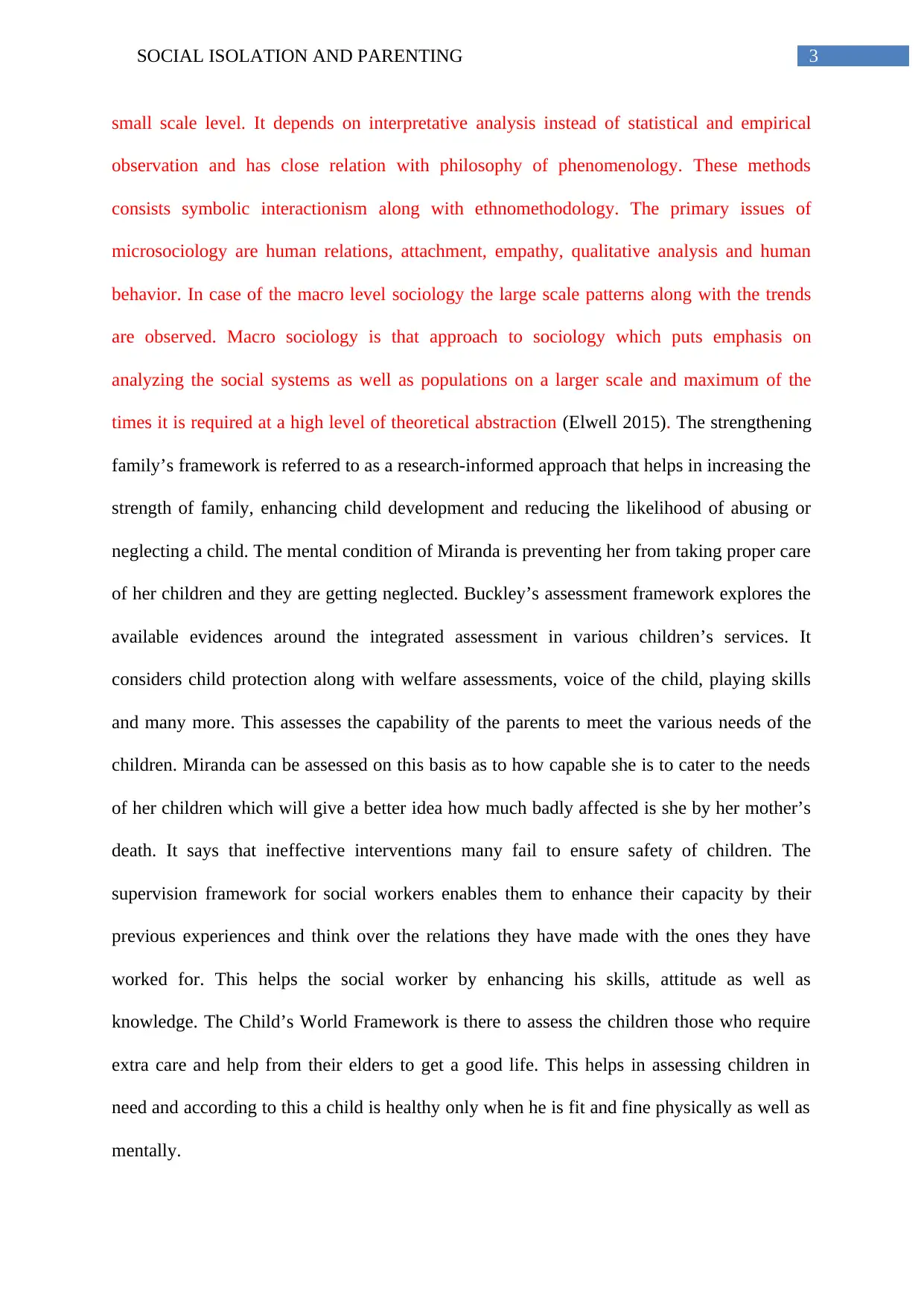
3SOCIAL ISOLATION AND PARENTING
small scale level. It depends on interpretative analysis instead of statistical and empirical
observation and has close relation with philosophy of phenomenology. These methods
consists symbolic interactionism along with ethnomethodology. The primary issues of
microsociology are human relations, attachment, empathy, qualitative analysis and human
behavior. In case of the macro level sociology the large scale patterns along with the trends
are observed. Macro sociology is that approach to sociology which puts emphasis on
analyzing the social systems as well as populations on a larger scale and maximum of the
times it is required at a high level of theoretical abstraction (Elwell 2015). The strengthening
family’s framework is referred to as a research-informed approach that helps in increasing the
strength of family, enhancing child development and reducing the likelihood of abusing or
neglecting a child. The mental condition of Miranda is preventing her from taking proper care
of her children and they are getting neglected. Buckley’s assessment framework explores the
available evidences around the integrated assessment in various children’s services. It
considers child protection along with welfare assessments, voice of the child, playing skills
and many more. This assesses the capability of the parents to meet the various needs of the
children. Miranda can be assessed on this basis as to how capable she is to cater to the needs
of her children which will give a better idea how much badly affected is she by her mother’s
death. It says that ineffective interventions many fail to ensure safety of children. The
supervision framework for social workers enables them to enhance their capacity by their
previous experiences and think over the relations they have made with the ones they have
worked for. This helps the social worker by enhancing his skills, attitude as well as
knowledge. The Child’s World Framework is there to assess the children those who require
extra care and help from their elders to get a good life. This helps in assessing children in
need and according to this a child is healthy only when he is fit and fine physically as well as
mentally.
small scale level. It depends on interpretative analysis instead of statistical and empirical
observation and has close relation with philosophy of phenomenology. These methods
consists symbolic interactionism along with ethnomethodology. The primary issues of
microsociology are human relations, attachment, empathy, qualitative analysis and human
behavior. In case of the macro level sociology the large scale patterns along with the trends
are observed. Macro sociology is that approach to sociology which puts emphasis on
analyzing the social systems as well as populations on a larger scale and maximum of the
times it is required at a high level of theoretical abstraction (Elwell 2015). The strengthening
family’s framework is referred to as a research-informed approach that helps in increasing the
strength of family, enhancing child development and reducing the likelihood of abusing or
neglecting a child. The mental condition of Miranda is preventing her from taking proper care
of her children and they are getting neglected. Buckley’s assessment framework explores the
available evidences around the integrated assessment in various children’s services. It
considers child protection along with welfare assessments, voice of the child, playing skills
and many more. This assesses the capability of the parents to meet the various needs of the
children. Miranda can be assessed on this basis as to how capable she is to cater to the needs
of her children which will give a better idea how much badly affected is she by her mother’s
death. It says that ineffective interventions many fail to ensure safety of children. The
supervision framework for social workers enables them to enhance their capacity by their
previous experiences and think over the relations they have made with the ones they have
worked for. This helps the social worker by enhancing his skills, attitude as well as
knowledge. The Child’s World Framework is there to assess the children those who require
extra care and help from their elders to get a good life. This helps in assessing children in
need and according to this a child is healthy only when he is fit and fine physically as well as
mentally.
Paraphrase This Document
Need a fresh take? Get an instant paraphrase of this document with our AI Paraphraser
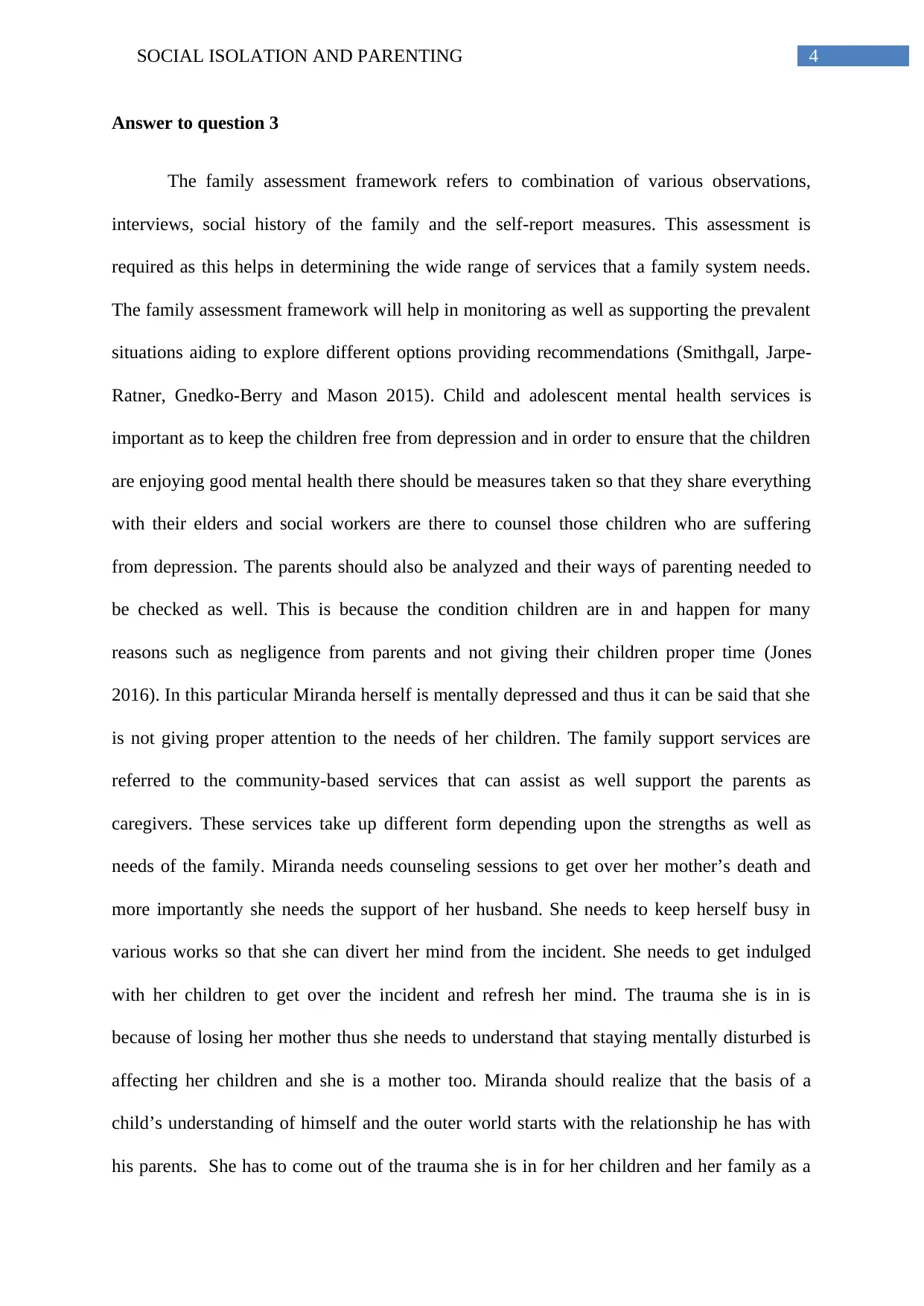
4SOCIAL ISOLATION AND PARENTING
Answer to question 3
The family assessment framework refers to combination of various observations,
interviews, social history of the family and the self-report measures. This assessment is
required as this helps in determining the wide range of services that a family system needs.
The family assessment framework will help in monitoring as well as supporting the prevalent
situations aiding to explore different options providing recommendations (Smithgall, Jarpe-
Ratner, Gnedko-Berry and Mason 2015). Child and adolescent mental health services is
important as to keep the children free from depression and in order to ensure that the children
are enjoying good mental health there should be measures taken so that they share everything
with their elders and social workers are there to counsel those children who are suffering
from depression. The parents should also be analyzed and their ways of parenting needed to
be checked as well. This is because the condition children are in and happen for many
reasons such as negligence from parents and not giving their children proper time (Jones
2016). In this particular Miranda herself is mentally depressed and thus it can be said that she
is not giving proper attention to the needs of her children. The family support services are
referred to the community-based services that can assist as well support the parents as
caregivers. These services take up different form depending upon the strengths as well as
needs of the family. Miranda needs counseling sessions to get over her mother’s death and
more importantly she needs the support of her husband. She needs to keep herself busy in
various works so that she can divert her mind from the incident. She needs to get indulged
with her children to get over the incident and refresh her mind. The trauma she is in is
because of losing her mother thus she needs to understand that staying mentally disturbed is
affecting her children and she is a mother too. Miranda should realize that the basis of a
child’s understanding of himself and the outer world starts with the relationship he has with
his parents. She has to come out of the trauma she is in for her children and her family as a
Answer to question 3
The family assessment framework refers to combination of various observations,
interviews, social history of the family and the self-report measures. This assessment is
required as this helps in determining the wide range of services that a family system needs.
The family assessment framework will help in monitoring as well as supporting the prevalent
situations aiding to explore different options providing recommendations (Smithgall, Jarpe-
Ratner, Gnedko-Berry and Mason 2015). Child and adolescent mental health services is
important as to keep the children free from depression and in order to ensure that the children
are enjoying good mental health there should be measures taken so that they share everything
with their elders and social workers are there to counsel those children who are suffering
from depression. The parents should also be analyzed and their ways of parenting needed to
be checked as well. This is because the condition children are in and happen for many
reasons such as negligence from parents and not giving their children proper time (Jones
2016). In this particular Miranda herself is mentally depressed and thus it can be said that she
is not giving proper attention to the needs of her children. The family support services are
referred to the community-based services that can assist as well support the parents as
caregivers. These services take up different form depending upon the strengths as well as
needs of the family. Miranda needs counseling sessions to get over her mother’s death and
more importantly she needs the support of her husband. She needs to keep herself busy in
various works so that she can divert her mind from the incident. She needs to get indulged
with her children to get over the incident and refresh her mind. The trauma she is in is
because of losing her mother thus she needs to understand that staying mentally disturbed is
affecting her children and she is a mother too. Miranda should realize that the basis of a
child’s understanding of himself and the outer world starts with the relationship he has with
his parents. She has to come out of the trauma she is in for her children and her family as a
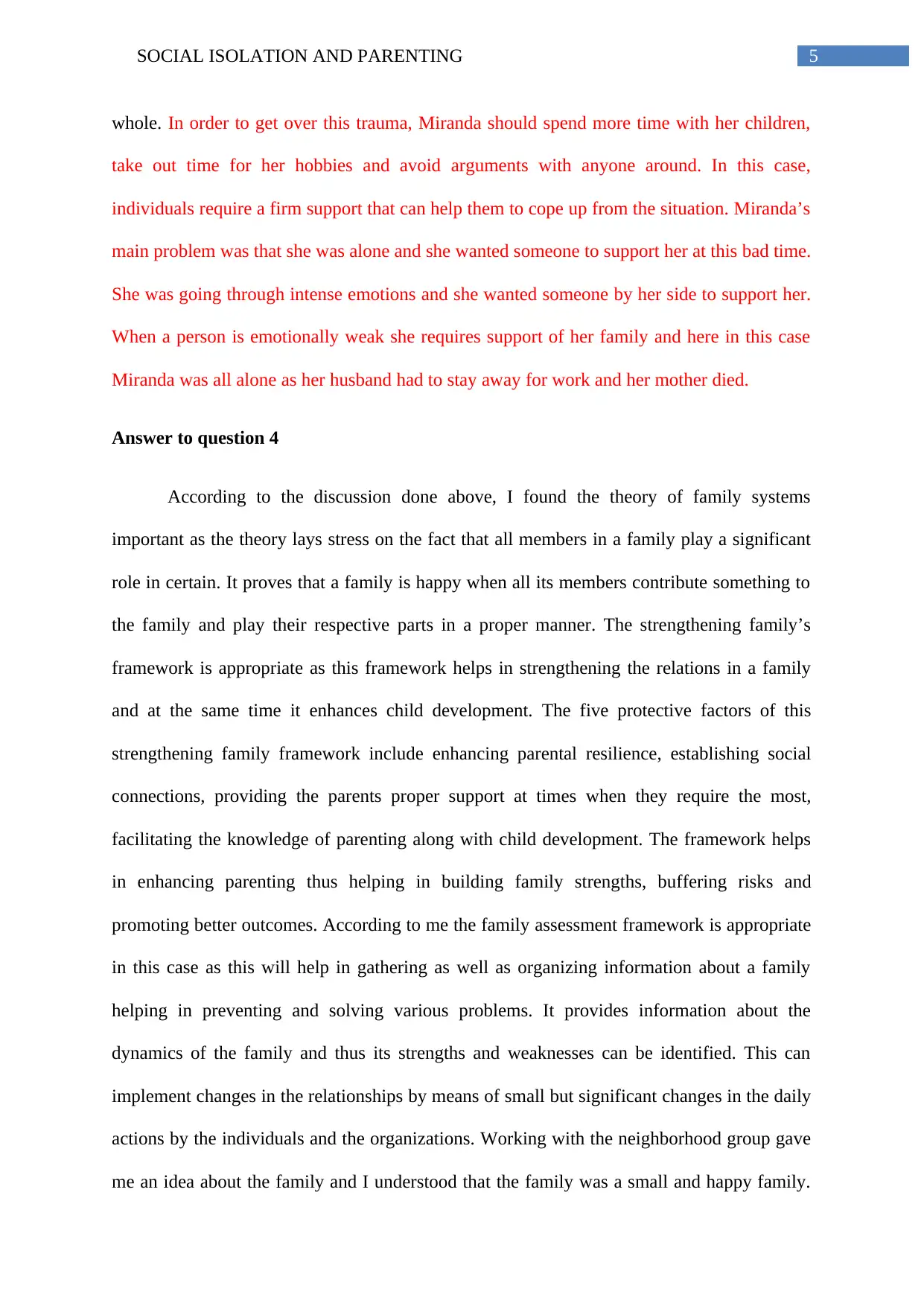
5SOCIAL ISOLATION AND PARENTING
whole. In order to get over this trauma, Miranda should spend more time with her children,
take out time for her hobbies and avoid arguments with anyone around. In this case,
individuals require a firm support that can help them to cope up from the situation. Miranda’s
main problem was that she was alone and she wanted someone to support her at this bad time.
She was going through intense emotions and she wanted someone by her side to support her.
When a person is emotionally weak she requires support of her family and here in this case
Miranda was all alone as her husband had to stay away for work and her mother died.
Answer to question 4
According to the discussion done above, I found the theory of family systems
important as the theory lays stress on the fact that all members in a family play a significant
role in certain. It proves that a family is happy when all its members contribute something to
the family and play their respective parts in a proper manner. The strengthening family’s
framework is appropriate as this framework helps in strengthening the relations in a family
and at the same time it enhances child development. The five protective factors of this
strengthening family framework include enhancing parental resilience, establishing social
connections, providing the parents proper support at times when they require the most,
facilitating the knowledge of parenting along with child development. The framework helps
in enhancing parenting thus helping in building family strengths, buffering risks and
promoting better outcomes. According to me the family assessment framework is appropriate
in this case as this will help in gathering as well as organizing information about a family
helping in preventing and solving various problems. It provides information about the
dynamics of the family and thus its strengths and weaknesses can be identified. This can
implement changes in the relationships by means of small but significant changes in the daily
actions by the individuals and the organizations. Working with the neighborhood group gave
me an idea about the family and I understood that the family was a small and happy family.
whole. In order to get over this trauma, Miranda should spend more time with her children,
take out time for her hobbies and avoid arguments with anyone around. In this case,
individuals require a firm support that can help them to cope up from the situation. Miranda’s
main problem was that she was alone and she wanted someone to support her at this bad time.
She was going through intense emotions and she wanted someone by her side to support her.
When a person is emotionally weak she requires support of her family and here in this case
Miranda was all alone as her husband had to stay away for work and her mother died.
Answer to question 4
According to the discussion done above, I found the theory of family systems
important as the theory lays stress on the fact that all members in a family play a significant
role in certain. It proves that a family is happy when all its members contribute something to
the family and play their respective parts in a proper manner. The strengthening family’s
framework is appropriate as this framework helps in strengthening the relations in a family
and at the same time it enhances child development. The five protective factors of this
strengthening family framework include enhancing parental resilience, establishing social
connections, providing the parents proper support at times when they require the most,
facilitating the knowledge of parenting along with child development. The framework helps
in enhancing parenting thus helping in building family strengths, buffering risks and
promoting better outcomes. According to me the family assessment framework is appropriate
in this case as this will help in gathering as well as organizing information about a family
helping in preventing and solving various problems. It provides information about the
dynamics of the family and thus its strengths and weaknesses can be identified. This can
implement changes in the relationships by means of small but significant changes in the daily
actions by the individuals and the organizations. Working with the neighborhood group gave
me an idea about the family and I understood that the family was a small and happy family.
⊘ This is a preview!⊘
Do you want full access?
Subscribe today to unlock all pages.

Trusted by 1+ million students worldwide
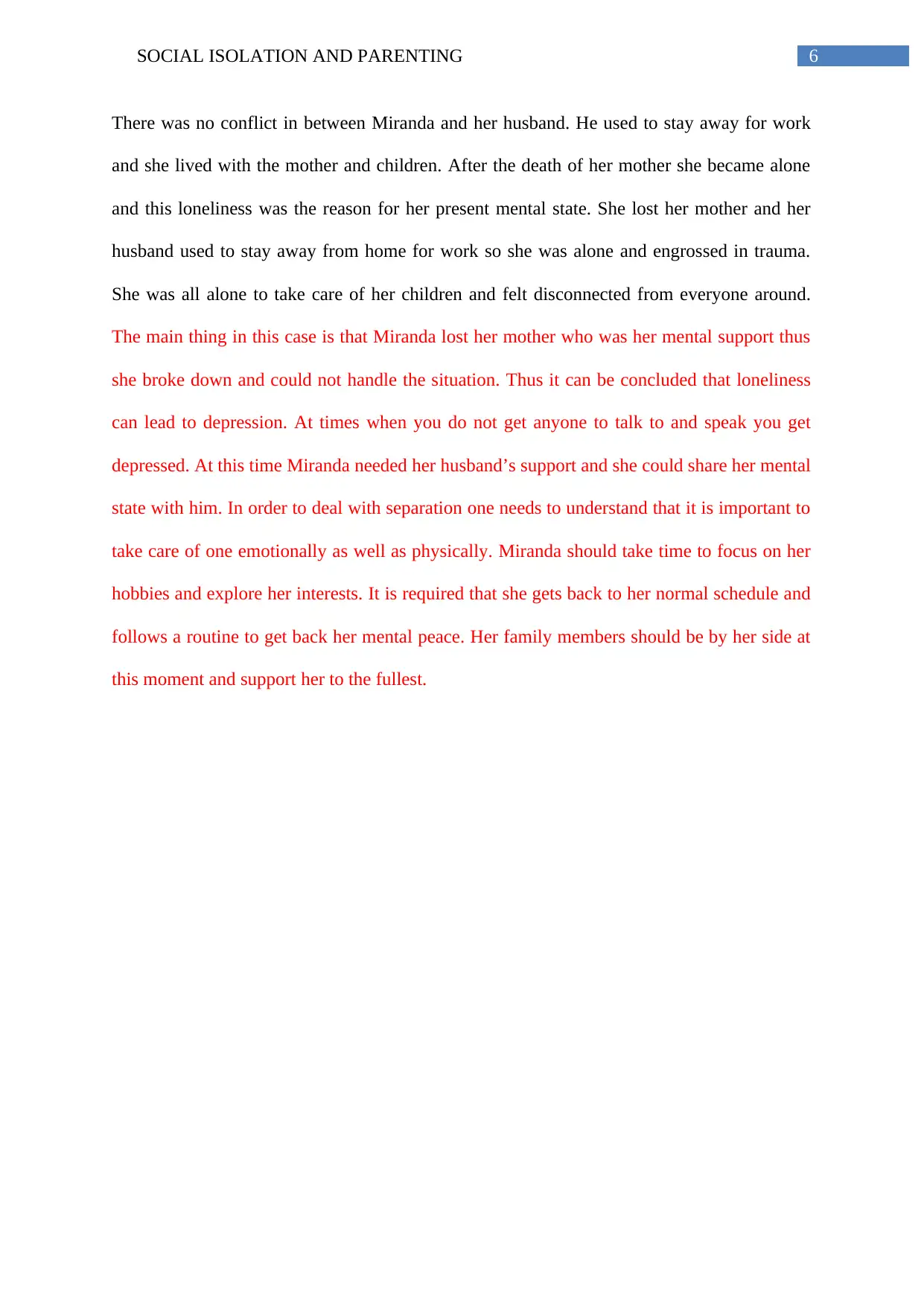
6SOCIAL ISOLATION AND PARENTING
There was no conflict in between Miranda and her husband. He used to stay away for work
and she lived with the mother and children. After the death of her mother she became alone
and this loneliness was the reason for her present mental state. She lost her mother and her
husband used to stay away from home for work so she was alone and engrossed in trauma.
She was all alone to take care of her children and felt disconnected from everyone around.
The main thing in this case is that Miranda lost her mother who was her mental support thus
she broke down and could not handle the situation. Thus it can be concluded that loneliness
can lead to depression. At times when you do not get anyone to talk to and speak you get
depressed. At this time Miranda needed her husband’s support and she could share her mental
state with him. In order to deal with separation one needs to understand that it is important to
take care of one emotionally as well as physically. Miranda should take time to focus on her
hobbies and explore her interests. It is required that she gets back to her normal schedule and
follows a routine to get back her mental peace. Her family members should be by her side at
this moment and support her to the fullest.
There was no conflict in between Miranda and her husband. He used to stay away for work
and she lived with the mother and children. After the death of her mother she became alone
and this loneliness was the reason for her present mental state. She lost her mother and her
husband used to stay away from home for work so she was alone and engrossed in trauma.
She was all alone to take care of her children and felt disconnected from everyone around.
The main thing in this case is that Miranda lost her mother who was her mental support thus
she broke down and could not handle the situation. Thus it can be concluded that loneliness
can lead to depression. At times when you do not get anyone to talk to and speak you get
depressed. At this time Miranda needed her husband’s support and she could share her mental
state with him. In order to deal with separation one needs to understand that it is important to
take care of one emotionally as well as physically. Miranda should take time to focus on her
hobbies and explore her interests. It is required that she gets back to her normal schedule and
follows a routine to get back her mental peace. Her family members should be by her side at
this moment and support her to the fullest.
Paraphrase This Document
Need a fresh take? Get an instant paraphrase of this document with our AI Paraphraser
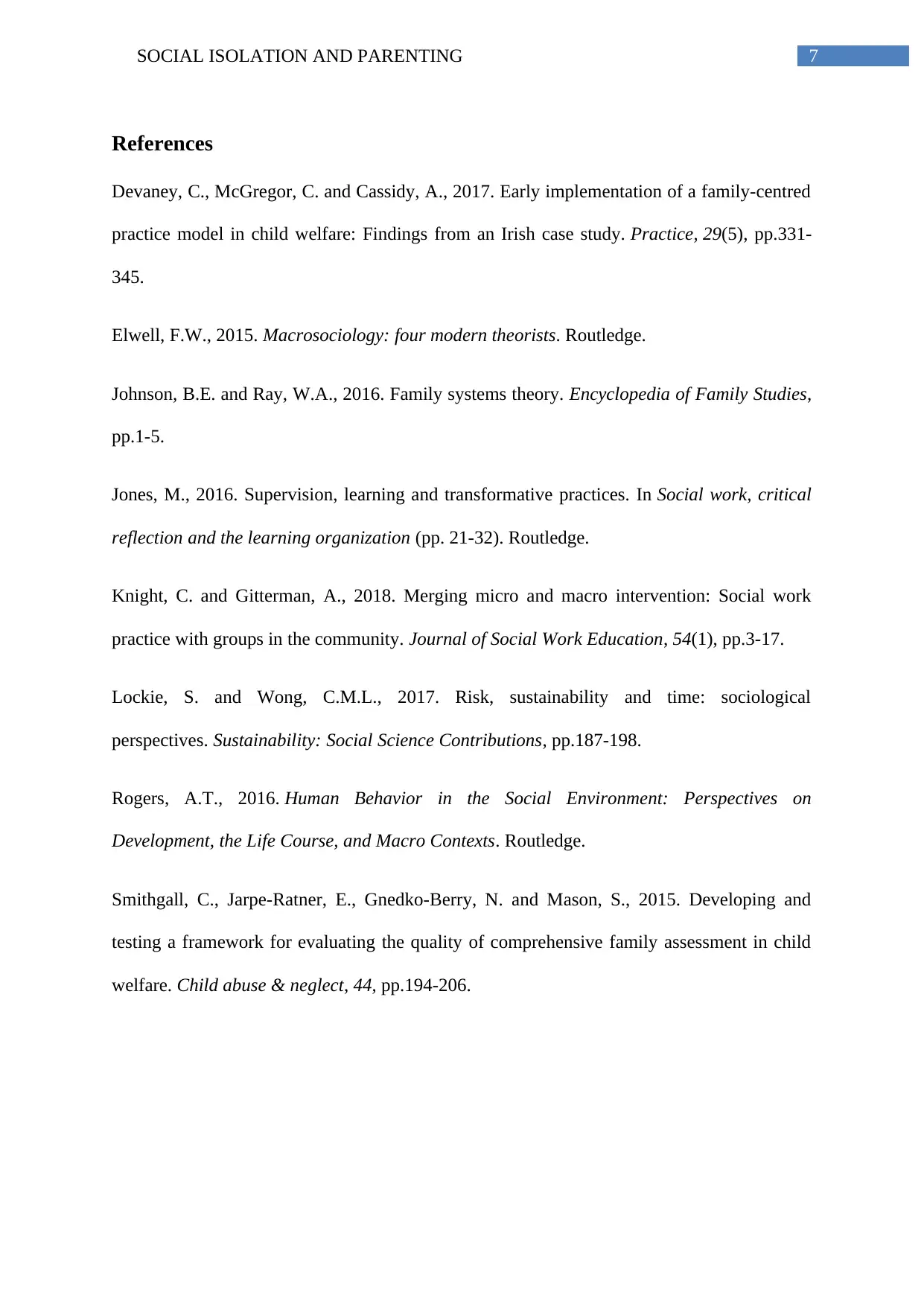
7SOCIAL ISOLATION AND PARENTING
References
Devaney, C., McGregor, C. and Cassidy, A., 2017. Early implementation of a family-centred
practice model in child welfare: Findings from an Irish case study. Practice, 29(5), pp.331-
345.
Elwell, F.W., 2015. Macrosociology: four modern theorists. Routledge.
Johnson, B.E. and Ray, W.A., 2016. Family systems theory. Encyclopedia of Family Studies,
pp.1-5.
Jones, M., 2016. Supervision, learning and transformative practices. In Social work, critical
reflection and the learning organization (pp. 21-32). Routledge.
Knight, C. and Gitterman, A., 2018. Merging micro and macro intervention: Social work
practice with groups in the community. Journal of Social Work Education, 54(1), pp.3-17.
Lockie, S. and Wong, C.M.L., 2017. Risk, sustainability and time: sociological
perspectives. Sustainability: Social Science Contributions, pp.187-198.
Rogers, A.T., 2016. Human Behavior in the Social Environment: Perspectives on
Development, the Life Course, and Macro Contexts. Routledge.
Smithgall, C., Jarpe-Ratner, E., Gnedko-Berry, N. and Mason, S., 2015. Developing and
testing a framework for evaluating the quality of comprehensive family assessment in child
welfare. Child abuse & neglect, 44, pp.194-206.
References
Devaney, C., McGregor, C. and Cassidy, A., 2017. Early implementation of a family-centred
practice model in child welfare: Findings from an Irish case study. Practice, 29(5), pp.331-
345.
Elwell, F.W., 2015. Macrosociology: four modern theorists. Routledge.
Johnson, B.E. and Ray, W.A., 2016. Family systems theory. Encyclopedia of Family Studies,
pp.1-5.
Jones, M., 2016. Supervision, learning and transformative practices. In Social work, critical
reflection and the learning organization (pp. 21-32). Routledge.
Knight, C. and Gitterman, A., 2018. Merging micro and macro intervention: Social work
practice with groups in the community. Journal of Social Work Education, 54(1), pp.3-17.
Lockie, S. and Wong, C.M.L., 2017. Risk, sustainability and time: sociological
perspectives. Sustainability: Social Science Contributions, pp.187-198.
Rogers, A.T., 2016. Human Behavior in the Social Environment: Perspectives on
Development, the Life Course, and Macro Contexts. Routledge.
Smithgall, C., Jarpe-Ratner, E., Gnedko-Berry, N. and Mason, S., 2015. Developing and
testing a framework for evaluating the quality of comprehensive family assessment in child
welfare. Child abuse & neglect, 44, pp.194-206.
1 out of 8
Related Documents
Your All-in-One AI-Powered Toolkit for Academic Success.
+13062052269
info@desklib.com
Available 24*7 on WhatsApp / Email
![[object Object]](/_next/static/media/star-bottom.7253800d.svg)
Unlock your academic potential
Copyright © 2020–2026 A2Z Services. All Rights Reserved. Developed and managed by ZUCOL.





